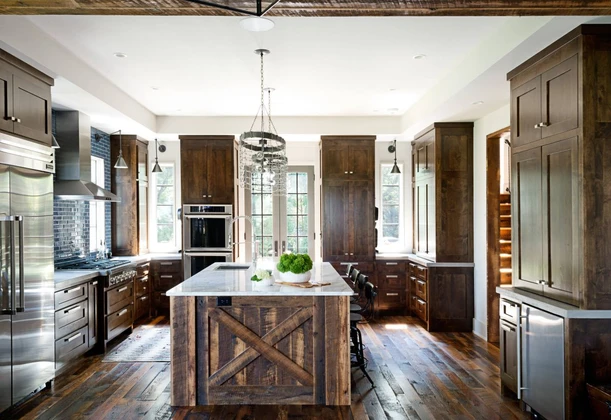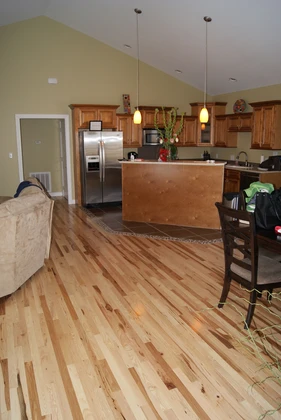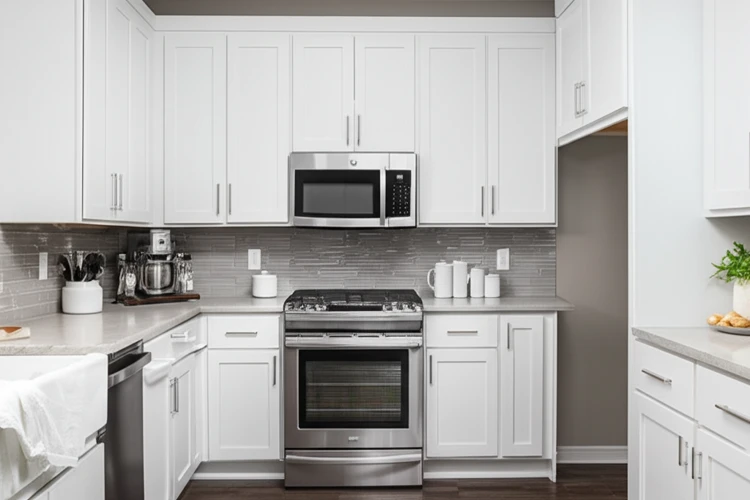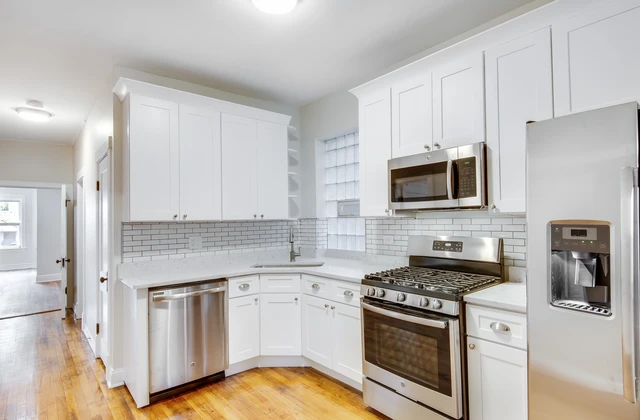Disclaimer: As an Amazon Associate, I earn commission from qualifying purchases.
Remodeling a kitchen can be an exciting yet daunting task for homeowners, renters, and kitchen enthusiasts. The primary question that often arises is, “Do you need a permit to remodel a kitchen?” This comprehensive guide, backed by years of experience in home remodeling, will address this query in detail.
By referencing industry publications like HomeAdvisor and Houzz, we aim to provide a well-rounded understanding of the permitting process. Please note that while this guide offers general advice, consulting local authorities for specific requirements is crucial.
The Importance of Kitchen Remodeling Permits
Obtaining permits for kitchen remodeling is not just a bureaucratic hurdle; it’s essential for safety, compliance, and future resale value. According to a study by the National Association of Realtors, homes with proper permits sell faster and at higher prices. Permits ensure that your project meets local building codes and safety standards, which can prevent costly mistakes and potential hazards.
On the downside, obtaining permits can add to the overall cost and timeline of your project. However, the long-term benefits often outweigh these initial drawbacks. For instance, if you plan to sell your home in the future, having the necessary permits can make the process smoother and more profitable.
Types of Kitchen Remodeling Projects That Require Permits
Certain kitchen remodeling projects typically require permits due to their complexity and potential impact on the home’s structure and safety. Here are some common examples:
- Structural Changes: Any modifications to load-bearing walls, adding or removing walls, or changing the layout of the kitchen usually require a permit. These changes can affect the structural integrity of the house, making permits essential.
- Electrical Work: Installing new electrical outlets, rewiring, or upgrading the electrical panel often necessitates a permit. This ensures that the work meets safety standards and prevents electrical hazards.
- Plumbing Modifications: Changing the layout of plumbing, installing new fixtures, or moving water lines typically requires a permit. Proper permitting ensures that the plumbing work is up to code and prevents water damage or other issues.
The cost of obtaining permits can vary widely depending on the project’s scope and local regulations. For example, a simple electrical permit might cost around $50, while a major structural change could cost several hundred dollars.
Types of Kitchen Remodeling Projects That Don’t Require Permits
Not all kitchen remodeling projects require permits. Minor updates that do not affect the home’s structure or safety systems often fall into this category. Here are some examples:
- Painting: Whether you’re painting walls, cabinets, or other surfaces, this cosmetic change usually does not require a permit.
- Cabinet Refacing: Updating cabinet doors, hardware, or refacing cabinets is generally considered a minor update that does not need a permit.
- Flooring Replacements: Replacing flooring materials like tiles, hardwood, or laminate typically does not require a permit, as long as it does not involve structural changes.
While these projects are generally permit-free, it’s always a good idea to check local regulations, as they can vary. For DIY enthusiasts, these projects offer a great opportunity to enhance your kitchen without the hassle of permitting.
How to Determine if You Need a Permit for Your Kitchen Remodel
Determining if your specific kitchen remodeling project requires a permit involves a few steps:
- Identify the Scope of Work: Clearly define what changes you plan to make. This includes structural modifications, electrical work, plumbing changes, and cosmetic updates.
- Consult Local Building Codes: Visit your local building department’s website or contact them directly to understand the permitting requirements for your project. Most municipalities have detailed guidelines available online.
- Check with HOA: If you live in a community governed by a Homeowners Association (HOA), review their guidelines as well. HOAs often have their own set of rules that may impact your project.
Here is a checklist based on professional experience to help you determine if a permit is needed:
- Are you making any structural changes?
- Will the project involve electrical work beyond minor repairs?
- Are you modifying the plumbing layout?
- Does the project involve changes to HVAC systems?
- Are you altering the home’s exterior in any way?
The Permit Application Process
Applying for a kitchen remodeling permit involves several steps. Here’s a detailed guide to help you through the process:
-
- Prepare Documentation: Gather all necessary documents, including project plans, drawings, and any required permits from other agencies (e.g., electrical or plumbing permits).
- Submit Application: Fill out the permit application form, which can usually be found on your local building department’s website. Submit the form along with the required documentation and fees.
- Wait for Review: The review process can take anywhere from a few days to several weeks, depending on the complexity of the project and the workload of the building department.
- Schedule Inspections: Once the permit is approved, schedule any necessary inspections to ensure that the work is being done according to code. Final inspections are typically required before the project can be signed off as complete.
The timeline and costs involved can vary. For simple projects, the permit might be issued within a week, while more complex projects could take several weeks. Costs can range from $50 to several hundred dollars, depending on the scope of work.
Common Pitfalls to Avoid When Applying for a Permit
Applying for a permit can be a straightforward process, but there are common pitfalls to avoid:
-
-
- Incomplete Documentation: Ensure that all required documents are submitted with the application. Missing paperwork can delay the process significantly.
- Ignoring Local Regulations: Familiarize yourself with local building codes and regulations. Non-compliance can lead to permit denial or costly revisions.
- Not Scheduling Inspections: Make sure to schedule inspections at the appropriate stages of the project. Skipping inspections can result in delays and additional costs.
-
From professional experience, anecdotes reveal that many homeowners underestimate the importance of thorough preparation. Taking the time to gather all necessary documents and understand local regulations can save a lot of headaches down the line.
Working with Contractors: Do They Handle Permits?
When working with contractors, it’s important to understand their role in the permit process. Many reputable contractors will handle the permitting process for you, ensuring that all necessary permits are obtained and inspections are scheduled. However, it’s crucial to clarify this with your contractor before hiring them.
Contractors who handle permits offer several advantages:
-
-
- Expertise: They have experience dealing with local building departments and know the specific requirements for your area.
- Efficiency: They can streamline the process, ensuring that all documentation is in order and inspections are scheduled promptly.
- Compliance: They ensure that the work is done according to code, reducing the risk of costly revisions or delays.
-
On the other hand, some contractors may not handle permits, leaving this responsibility to the homeowner. It’s essential to discuss this aspect during the hiring process to avoid any misunderstandings.
The Role of Homeowners Associations (HOAs) in Kitchen Remodeling
Homeowners Associations (HOAs) can play a significant role in kitchen remodeling projects, especially in communities with strict guidelines. HOAs often have their own set of rules and regulations that homeowners must adhere to. These can include:
-
-
- Design Guidelines: Specific requirements for materials, colors, and overall design to maintain a consistent look within the community.
- Permit Requirements: Additional permits or approvals that may be required beyond local building codes.
- Inspection Processes: HOAs may have their own inspection processes to ensure compliance with their guidelines.
-
It’s important to review your HOA’s guidelines before starting any kitchen remodeling project. Non-compliance can result in fines, delays, or even the need to reverse the changes made.
Permit Requirements for Historical or Listed Buildings
Remodeling kitchens in historical or listed buildings comes with its own set of unique challenges and requirements. These buildings often have strict preservation guidelines to maintain their historical integrity. Permit requirements for such projects can include:
-
-
- Historical Preservation Guidelines: Specific rules to ensure that the remodel does not compromise the building’s historical significance.
- Additional Approvals: Permits from historical preservation societies or local historical commissions may be required.
- Special Materials and Techniques: Use of historically accurate materials and construction techniques to maintain the building’s character.
-
While these requirements can add complexity to the project, they are essential for preserving the historical value of the building. Working with contractors experienced in historical preservation can be beneficial in navigating these requirements.
Environmental Considerations for Kitchen Remodeling
Kitchen remodeling can have a significant environmental impact, making it important to consider eco-friendly practices and obtain any necessary environmental permits. Here are some key considerations:
-
-
- Waste Management: Proper disposal of construction waste to minimize environmental impact.
- Energy Efficiency: Use of energy-efficient appliances and materials to reduce energy consumption.
- Sustainable Materials: Incorporation of sustainable materials like recycled glass, bamboo, or reclaimed wood.
-
Obtaining environmental permits may be necessary for projects that involve significant waste generation or changes to energy systems. Consulting local environmental regulations can provide guidance on the specific requirements for your project.
Frequently Asked Questions (FAQs)
What happens if I remodel my kitchen without a permit?
Remodeling a kitchen without a permit can lead to several issues. You may face fines, be required to obtain permits retroactively, or even have to undo the work and start over. Additionally, it can complicate the selling process and affect the home’s value. Always obtain the necessary permits to avoid these problems.
How long does it take to get a kitchen remodeling permit?
The timeline for obtaining a kitchen remodeling permit can vary widely depending on the project’s complexity and the local building department’s workload. Simple projects may take a few days, while more complex ones can take several weeks. It’s essential to factor this timeline into your overall project planning.
Can I get a permit retroactively if I’ve already started the remodel?
In some cases, it may be possible to obtain a permit retroactively, but this process can be more complicated and costly. You may need to provide additional documentation and undergo inspections to ensure that the work meets code. It’s always best to obtain permits before starting the project to avoid these issues.
Are there any penalties for not obtaining a permit?
Yes, there can be significant penalties for not obtaining the necessary permits. These can include fines, stop-work orders, and the requirement to undo the work and start over. In some cases, you may also face legal action. Always check with local authorities to understand the potential penalties for non-compliance.
How much does a kitchen remodeling permit typically cost?
The cost of a kitchen remodeling permit can vary widely depending on the project’s scope and local regulations. Simple permits may cost around $50, while more complex projects can cost several hundred dollars. It’s essential to factor these costs into your overall budget planning.
What happens if I sell my house and the buyer finds out I did not get permits?
If a buyer discovers that you did not obtain the necessary permits for your kitchen remodel, it can complicate the selling process. The buyer may require you to obtain the permits retroactively, which can be costly and time-consuming. Additionally, it can affect the home’s value and marketability. Always obtain the necessary permits to avoid these issues.
Conclusion
In conclusion, obtaining the necessary permits for kitchen remodeling projects is crucial for safety, compliance, and future resale value. This guide has provided a comprehensive overview of the permitting process, including the types of projects that require permits, the application process, and common pitfalls to avoid. Always consult local authorities for specific requirements and consider working with experienced contractors to ensure a smooth and successful remodeling project.







